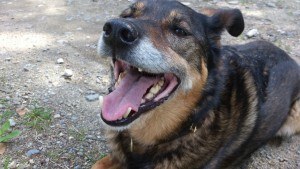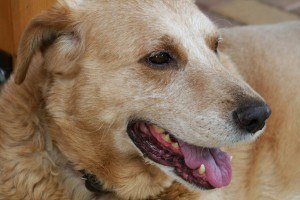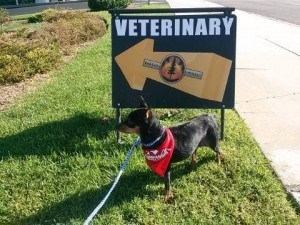
Older dogs are a constant sources of affection, love and fulfillment. However, as your dog ages, they become susceptible to common health conditions and require a different pattern of care. In this article, you will learn when your dog is considered a “senior,” the common health conditions that older dogs face, and steps you can take right now to enhance your senior dog’s quality of life and longevity!
When do dogs become senior?
It’s actually a complicated question. In general though, the larger the breed, the faster the process. A Great Dane might be considered a senior at 5-6 years old, while a Chihuahua probably won’t be a senior until 10-11 years old. Most dogs usually become senior between the 7-10 year range. Genetics, nutrition and environment all contribute to how fast your dog ages.
Common health issues for senior dogs
Senior (or “geriatric”) dogs are prone to common health conditions. Here, we’ll briefly describe what you should know about some of the most common ailments. As your dog’s owner, you’re in the best position to notice and report any of these symptoms to us. The earlier we catch the disease, the better the prognosis for your beloved companion.
Arthritis
Arthritis is a very common condition in older dogs. It is especially frequent in large breeds or overweight senior dogs. Your dog’s joint cartilage thins as they age, and cartilage cells die. When the cells die, they release an enzyme that causes joint inflammation and fluid buildup. This creates joint pain, which is why arthritic dogs tend to decrease their joint movement.
If your dog is arthritic, you’ll probably notice them shying away from once loved physical activities – like going for runs, bounding up the stairs, and jumping on the couch. Your dog might have difficulty sitting or standing, they may favor a limb, sleep more, gain weight, or just generally slow down.
Cancer
Cancer is responsible for about half the deaths in dogs over the age of 10. Cancer is the name given to a collection of related diseases. Some –like breast and testicular- are mostly preventable by spaying or neutering. Cancer is essentially an uncontrolled division of cells which then spread into surrounding tissues. As the cancerous cells spread, they can impede normal functioning in different bodily systems. This can cause devastating and fatal effects.
There are many different symptoms for cancer in pets, but a veterinarian is always required to accurately diagnose cancer. Often times when a dog has cancer you’ll notice abnormal swellings that persist and continue to grow. You may notice sores that heal slowly. Your dog may unexpectedly lose weight, have a decreased appetite, or have difficulty eating or swallowing. Some dogs change their urination patterns, bleed or discharge from a bodily opening (like the eyes or ears), and become less active. If you notice any of these symptoms in your older dogs, please know that it’s not necessarily being caused by cancer, but schedule a health exam with us right away.
Dementia
Signs of canine cognitive dysfunction (or “dog dementia”) are found in 50% of dogs over age 11. Dementia is a condition related to the aging of your dog’s brain and it inhibits normal mental abilities (such as memory, awareness and responsiveness). Dementia is a progressive disease; symptoms are usually mild and almost unnoticeable in the beginning. But as the disease progresses, the symptoms start to severely impact your dog’s quality of life.
Dogs suffering from dementia will usually exhibit changes in behavior. They may become easily confused, incessantly anxious, or overly irritable. Many dogs change their sleep cycle to be active at night and asleep during the day. Dogs with dementia might also forget past training, and will have difficulty learning new tasks.
Kidney Failure
Kidney failure is one of the most common causes of death in geriatric dogs. In healthy dogs, the kidneys filter the blood to remove potentially harmful toxins through urination. During kidney (or “renal”) failure, the kidneys lose their ability to remove these toxins. When this happens, dangerous toxins begin to accumulate in the bloodstream. Renal failure usually progresses over the course of months or years.
As a dog’s kidney fails, the dog requires more and more water to excrete the toxins through urination. That’s why sharply increased water consumption is a usual symptom of kidney failure in older dogs. You may also notice a chemical (or ammonia like) odor to your dog’s breath. Other common symptoms include pale gums, vomiting, blood in the urine, changes in urination patterns, or sudden weight loss. Some dogs begin to seem depressed or listless, and some even lose coordination which causes them to stumble around.
How to help your dog right now
Here we’ll walk you through steps you can take right now to enhance your senior dog’s lifespan and quality of life!
Biannual Health Exams
For your senior dog, the most important thing for you to do is to schedule veterinary health exams once every 6 months. This is very important for multiple reasons. First, it allows us to establish a baseline for your dog. This makes it much easier for us to spot when something becomes irregular. Another important factor is that it is crucial to catch diseases in geriatric dogs as early as possible. If we catch something early, we are much more effectively (and less expensively) able to treat it. This greatly enhances your dog’s quality of life and longevity!
During these biannual geriatric health exams, we will perform a thorough examination for your senior dog. We will check for signs and symptoms of possible health conditions. Depending on your dog’s individual needs, we may even perform diagnostic tests – such as urinalysis or a blood panel.
Keeping a healthy weight
Overweight geriatric dogs have higher rates of cancer, organ disease, arthritis, diabetes, and other health conditions. It’s important to keep your senior dog at a healthy weight through diet and exercise. Our veterinary team will educate you on your pet’s unique dietary and exercise needs. Overweight dogs must have a nutrition plan so that they still get vital nutrients while losing weight. Exercise will help keep your dog lean and maintain healthy joints and muscles. Every dog is different though – we can give you specific exercise recommendations based on your dog’s overall health.
Comfort at home
Older dogs are happiest when they’re mentally stimulated and physically comfortable. To keep your pet stimulated, make sure to have an abundance of safe and fun toys around their living area. Food puzzles can be a great way to accomplish this while cutting down on weight. Older dogs with joint problems find hard surfaces very uncomfortable, so make sure their bed has extra padding, and do your best to offer soft surfaces (like carpets and rugs) to walk on instead of hard floors.
And remember, you’re never alone. We care very deeply for you and your dog. We will be there for every stage of your dog’s life, and together we can make sure that your dog lives a wonderful, happy life by your side.










